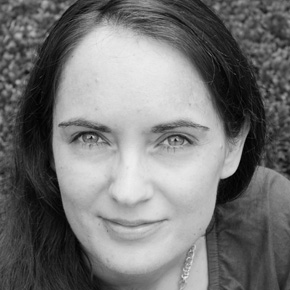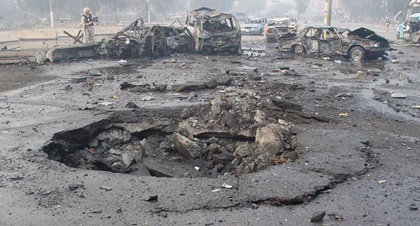Human terrain
by Emily BullockA latecomer slides into the middle row. “War Studies?” he asks the brunette next to him. She nods.
I tell the students to put away their texts.
“History isn’t in those books,” I say.
“Where is it then?” the latecomer asks.
A girl in the front runs a finger over her iPhone. “Bomb in Pakistan kills twelve. Syria accused of chemical attack. It’s in the news,” she says.
I shake my head. “News can often be as close to a fairy tale as Cinderella. As researchers, students, our job is to read between…”
“What about primary sources?” the latecomer says.
They all want something to hold up and say, Here it is: the truth. I only have these slides to show them. I press the button. Click. The projector beam snares dust, splitting apart rainbow colours before it hits the whiteboard.
“Here is one truth,” I say. “On Monday 5 March 2007, a car bomb exploded in Mutanabi Street, Iraq’s Green Zone in Baghdad’s bookselling quarter. Thirty people were killed. The fragments you’ll see here today were found scattered in the rubble, collected and preserved.” If my voice shakes when I say that date, no one in the room notices.
“Slide one,” I say, “a page from a girl’s diary, age 11¾…”
“But it’s in English,” the latecomer says.
“A translation isn’t a primary source at all,” says the brunette next to him.
“Translated and interpreted through the eyes of an adult, but maintaining the child’s narrative of her world at one particular moment,” I say.
“Why do we need to know about some girl and her family?” he says.
“At the bottom is a bit about their Honda being stolen. Maybe this to do with the car bomb,” the girl with the iPhone says.
“My brothers are serving in Iraq,” says the red-haired boy in the third row.
Hana was there that day. Clean-up operations. She collected floating pages from between the rubble, kept them with her kit. It must have been for a reason, a story to tell? But she never really was one for stories.”
Some families circulate the armed forces in their blood as if they have a red poppy rooted into their hearts. My daughter wasn’t from such a family but that didn’t stop her swearing to defend and honour.
Hana was there that day. Clean-up operations. She collected floating pages from between the rubble, kept them with her kit. It must have been for a reason, a story to tell? But she never really was one for stories; when she was little I tried to read her the great myths and epic tales. She was always asleep before I finished a page. But she would have made a good historian, questioning everything – Why, mum? Who says it happened that way? What happens to us when we die?
Click.
“Slide two. Probably a medical textbook. Note the words: ‘luminal obstruction, ineffective venous and lymphatic drainage. Bacterial invasion ultimately leading to…’”
“Deeaaaath,” the latecomer mimes a pantomime choking scene.
Laughter thumps against the peeling green paint on the walls. I lean against the lectern, let it take some of the weight. The water in the glass is dusty, left over from another class, but I drink it anyway. It sticks like grit between my teeth. Our first beach holiday to the Isle of Wight, Hana refused to eat any sandwiches because of the sand. But as an Arabic speaker she must have known where they would send her. Some of the students are tapping at keyboards, and the more they take notes, the more they raise their hands, the more I feel it all slipping away like sand through my fingers. But these fragments of paper, a manual, a schoolgirl’s diary – they are something Hana touched, important enough to keep tucked between her spare socks and chocolate stash.
“I signed up for War Studies, not show and tell,” the latecomer grins.
Hana’s mouth was smart too, even as a child she was full of backchat. But that Monday satellite call, our last, was pitted with silences. She said the connection was bad but it wasn’t that. I wondered afterwards if that space on the line was a sign of the final silence that was waiting for us.
“Is the Historian only there to cut the flesh, deliver the evidence? Or are they there at inception, sweating, thrusting, creating life? Can we trust our sources?”
Click.
“‘What you seek you shall not find’,” reads the girl with the iPhone. “It’s shorter than a tweet.”
“That’s a poem, ‘Gilgamesh’. We did it last term,” says the brunette.
“A voice captured in time, preserved down the ages,” I say.
The latecomer yawns, stretches his arms behind his head. “None of this stuff is real,” he says.
“If I hadn’t made fresh copies of these papers but left the dust and the blood maybe they would be more real, even if the Arabic couldn’t be understood?”
But he isn’t listening to me. He passes a Post-it note to the brunette; it sticks to his thumb before he shakes it off. I wanted something of Hana’s to stick to me. When I cleared out her room I hoped to uncover a diary, dig up forgotten letters – anything to hear her voice in my head again. But there was only dust under the bed, desiccated moths at the back of the cupboard. When her box of possessions wrapped in airmail tape arrived, those scraps of paper fell out like dried petals. I tried to put them together like the wooden jigsaw puzzles we did when she was small. Translating them into English, as if I could make the words fit together better that way.
“The course description said this class was about conflicts not this stuff,” the latecomer says.
I open my mouth to answer but my tongue feels too big, as if it might flop onto the lectern for all to see. That is how it’s felt since it happened, each day I carry Hana not in me but on the outside like an open wound.
“Human Terrain. The Army acknowledges, through the lessons of Afghanistan and Iraq, that human geography is as important as any satellite map.”
“Can we have a definition for the exam?” The latecomer says.
I see them watching me like I’m just a slide projection, the captured image of a relic in a museum display case. I don’t answer his question. A few inch their textbooks closer, others stare at the whiteboard beside me; I know all about that sweep-over look. Grief corrodes and poisons like a chemical attack. A friend from yoga abandoned her trolley in the freezer aisle of Waitrose just to avoid brushing past me; the kettle is always free when I enter the staff room; my diary cleared before the condolence cards hit the mat.
“Let me show you an example from an unidentified source.”
Click.
I give them time to process the words, from a poem or a prayer. It tells of clouds between rooftops, sky turning red, a desert storm fighting to break over the city walls, of starlings that are the first to return after the dust and the smoke and the screams have gone.
The sniggering has stopped.
“Al Mutanabi was a great Iraqi poet, the bookselling quarter a place of ideas and words and learning. What message would destroying such a place send?”
“Proust said it well enough: ‘the past made arid by intellect’,” the latecomer says. “Maybe someone wanted to start a new order.”
“Or control that intellect,” says the girl on the right, Styrofoam cup nestled between her palms.
The brunette taps a Biro against her teeth: click click. Head on one hand, tilting her view of the room. They think I’m only some old woman; my class only pass or fail. But I’m not done with them yet.”
I assess the human terrain of the room: they look so young; jaws yet to gain angles, eyes yet to cloud. The brunette has moved her arm closer to the latecomer, now they are touching. She writes something on the Post-it, slides it back to him. He will probably buy her a drink after class, she will buy the next round; tomorrow neither of them will wake up alone.
If I had known how my story would unfold, I would never have used contraception. I should have stacked up children like a survivalist hordes tinned goods. But it wouldn’t have made what happened hurt any less. Just like Hana’s satellite calls that I looked forward to so much always left me with an ache deep in my gut, the final click of the receiver like a salted paper-cut.
The brunette taps a Biro against her teeth: click click. Head on one hand, tilting her view of the room. They think I’m only some old woman; my class only pass or fail. But I’m not done with them yet.
“The final slide,’ I say, “is a photograph of the city. Shutters are up along Mutanabi Street, blue groundsheets loaded with books and printer cartridges. Not worrying about the cars parked so close to the shop fronts, not worrying about her next call of duty, not worrying about anything but the fresh white pages of precisely the one perfect book she just has to buy, my daughter writes herself into our history lesson.”
“Your daughter?” The brunette drops her pen, it rolls towards the front.
“Hana collected up the floating pages she found that day…”
“What about the car bomb?” the latecomer says.
So he was listening after all. But I don’t tell them how those papers were shipped back to me, along with her coffin swaddled in a flag. I mounted the scraps between cellophane sheets at the dining table, shrinking them onto slides as the grief expanded around me. But what did I hope to convey? To teach something of war? Of love?
The iPhone on the front desk vibrates, pulling them away from the picture of Baghdad. Time up.
“She wasn’t killed by the car bomb,” I say.
They smile, exhale a breath. I turn off the projector as they make for the exit. The door shuts behind them. Click.
It was sniper fire that killed her, later that night. Up on a hill (I don’t know its name) an insurgent took aim (I don’t know his name). At the occupiers, the destroyers, the infidels. A trigger clicked, a bullet travelled – ripping through Hana’s oesophagus, ricocheting off Hana’s spine, lodging in Hana’s heart. My future ripped apart by another man’s past.
History it isn’t.
 Emily Bullock has a Creative Writing MA from UEA and lives in London. She won the 2011 Bristol Short Story Prize with ‘My Girl’, which was also broadcast on BBC Radio 4, and her novel The Longest Fight has been acquired by Myriad editions for publication in Spring 2015. She recently completed her PhD at the Open University, where she also teaches Creative Writing.
Emily Bullock has a Creative Writing MA from UEA and lives in London. She won the 2011 Bristol Short Story Prize with ‘My Girl’, which was also broadcast on BBC Radio 4, and her novel The Longest Fight has been acquired by Myriad editions for publication in Spring 2015. She recently completed her PhD at the Open University, where she also teaches Creative Writing.
emilybullock.com
Author portrait © Robin Lindsey


